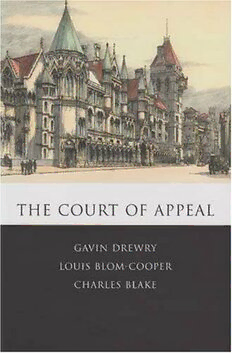
The Court of Appeal PDF
216 Pages·2007·0.727 MB·English
Most books are stored in the elastic cloud where traffic is expensive. For this reason, we have a limit on daily download.
Preview The Court of Appeal
Description:
Civil justice in the UK has been undergoing a massive transformation. There have been big changes in the management of judicial business, the Human Rights Act 1988 has had a pervasive impact, and the Constitutional Reform Act 2005 has effected many changes — notably, the prospective transfer of the appellate jurisdiction of the House of Lords to a new Supreme Court. Against this backcloth of radical change, this book looks at the recent history and the present-day operation of the civil division of the UK Court of Appeal — a court that, despite its pivotal position, has attracted surprisingly little scholarly attention. The book examines the impact of the permission to appeal requirements, and the way in which applications — particularly those by litigants in person — are handled. It also looks at the working methods of the Lords Justices and at the leadership of the Court by recent Masters of the Rolls, and it considers the relationship between the Court and the House of Lords, looking at high-profile cases in which the Court has been reversed by the Lords. Notwithstanding the impending arrival of the Supreme Court, the book concludes that 'the Court of Appeal will remain firmly in place, occupying its crucial position as, to all intents and purposes, the court of last resort — indeed, a supreme court — for most civil appellants.'
See more
The list of books you might like
Most books are stored in the elastic cloud where traffic is expensive. For this reason, we have a limit on daily download.
